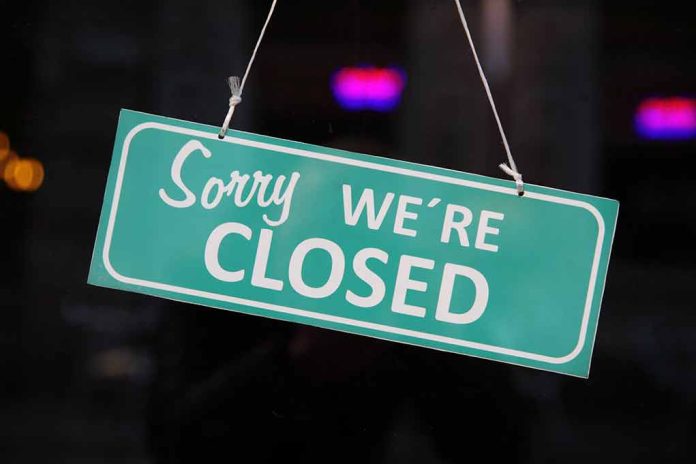
Big Lots’ bankruptcy could mean the end for nearly 300 stores and the loss of beloved discounts we’ve come to rely on.
At a Glance
- Big Lots has filed for Chapter 11 bankruptcy protection.
- Plans to close around 300 stores amidst financial struggles.
- A sale to Nexus Capital Management is imminent.
- The company aims to retain financial stability and better serve customers.
Big Lots Files for Bankruptcy Amid Financial Struggles
Big Lots, a widely recognized discount retail chain in the United States, has officially filed for Chapter 11 bankruptcy. This move comes after prolonged financial difficulties and shifting market dynamics that have chipped away at the company’s sustainability. The bankruptcy filing marks a critical juncture as Big Lots plans significant restructuring efforts. Among these efforts is the closure of approximately 300 underperforming stores across the country.
The challenges faced by Big Lots aren’t isolated events but part of a larger ‘retail apocalypse’ impacting many traditional retailers. High inflation, rising interest rates, and falling consumer spending have created an unfriendly environment for businesses that thrive on value-conscious customers. As Big Lots confronts these hurdles, the firm aims to emerge stronger through streamlined operations and a revamped business model.
New Ownership on the Horizon
At the heart of Big Lots’ restructuring effort is a significant ownership change. Nexus Capital Management, a leading investment firm, is positioned to acquire Big Lots’ assets and business operations. The forthcoming sale, expected to conclude in the fourth quarter barring any higher bids, symbolizes a fresh start for the ailing retailer. Nexus Capital will act as a “stalking horse” bidder in this court-supervised auction, paving the way for the company’s financial and operational stabilization.
CEO Bruce Thorn has shared his optimism stating, “The actions we are taking today will enable us to move forward with new owners who believe in our business and provide financial stability, while we optimize our operational footprint, accelerate improvement in our performance, and deliver on our promise to be the leader in extreme value.” This statement underscores the strategic importance of Nexus Capital’s involvement, as the investment firm brings considerable expertise and resources to aid Big Lots in navigating through its financial woes.
🚨🇺🇸BIG LOTS SELLS BUSINESS TO NEXUS CAPITAL AMID BANKRUPTCY PROCEEDINGS
U.S. discount retailer Big Lots has filed for Chapter 11 bankruptcy and agreed to sell its business to Nexus Capital for $707.5 million.
Nexus will act as a "stalking horse bidder" in a court-supervised… pic.twitter.com/5wE48UgYoy
— Mario Nawfal (@MarioNawfal) September 9, 2024
Financial Challenges and Customer Behavior
The factors leading to Big Lots’ financial instability are multi-faceted. Despite operating nearly 1,400 stores in 48 states, Big Lots has struggled with declining same-store sales for nine consecutive quarters. The company also holds nearly $3.1 billion in debt against $3.18 billion in assets. Additionally, Big Lots’ core customer base has reduced discretionary spending on items such as home and seasonal products, affecting the company’s sales and profitability.
Adding to the woes, the persistent high inflation and climbing interest rates have constrained consumer purchasing power and increased operational costs for Big Lots. Retail analyst Neil Saunders pointed out, “Big Lots operates in a very crowded and competitive market where other value players do a far better job of delivering on low prices and compelling bargains. It needs to step up its game if it is to succeed post-bankruptcy.” Therefore, the company’s ability to adapt to evolving consumer preferences will play a crucial role in its recovery.
“Big Lots operates in a very crowded and competitive market where other value players do a far better job of delivering on low prices and compelling bargains. It needs to step up its game if it is to succeed post-bankruptcy,” – Neil Saunders, managing director of GlobalData, said in an emailed statement.
Future Prospects and Store Closures
While the bankruptcy filing underscores the grim state of Big Lots’ financial health, the plans for store closures and restructuring aim to ensure a more sustainable future. The company has announced a plan to close about 300 of its stores by the end of the year, with the possibility of more closures depending on performance metrics. Despite these closures, most store locations and the company website will remain operational during the restructuring process.
Big Lots has secured $707.5 million in financing to aid in ongoing operations, including $35 million from current lenders. CEO Bruce Thorn reiterated the company’s commitment to financial stability, stating, “Though the majority of our store locations are profitable, we intend to move forward with a more focused footprint to ensure that we operate efficiently and are best positioned to serve our customers.” By optimizing its store fleet and increasing the efficiency of its operations, Big Lots hopes to deliver better value and service to its customer base.
As Big Lots braces for a transformative period, the company’s future hinges on effectively minimizing its debt, enhancing its value proposition, and regaining consumer trust. The steps taken today will determine whether Big Lots can reinvent itself and thrive in a highly competitive retail landscape. The coming months will be pivotal as the company navigates through bankruptcy, ownership changes, and operational restructuring to secure a path toward revival.






















